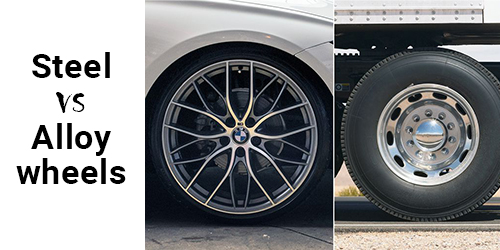Choosing the correct tires for your vehicles is very important. Tires and wheels are also a very important part of the vehicle that increases the exterior elegance of the vehicle. The tires are the highest impact components of the vehicles because of these reasons:
- Wheels make the car run smoother by reducing the friction from the ground by providing leverage to move a car in a forwarding direction.
- The primary function of the wheel is to transmit power from the engine to the ground. All the strength to accelerate, brake, or handling the car is the result of the precise wheel of your vehicle.
- Wheels support the weight of your vehicle without any suspension and shock.
From these points it is clear that the wheel is a primary component of the vehicles, they are useful for the operation of the car as well as maintaining the weight of passengers, so choosing the correct wheel for your vehicle is necessary.
The most important choice for your wheels is between alloy and steel, as these are the two most common wheels that are used. Each wheel has its advantage and disadvantage. Let us discover both wheels based on their performance, durability, and strength.
Alloy wheels
Alloy wheels are cast from a mixture of aluminum, nickel and magnesium, and other metals. Aluminum is used in the wheel of the vehicle because it is lightweight, and because of its lightweight they are less durable and also compromises with strength and maintenance cost. These wheels are more prone to damage if they hit the curb.

Pros of alloy wheels
- Alloy wheels are lightweight and they allow better handling of the vehicles.
- Due to their lightweight, they have a lower unsprung mass that helps to improve the fuel economy of the vehicle.
- Alloy wheels suits on sports cars, show cars, and ultra-high performance vehicles
- In alloy wheels, you can do customization with the spikes, as well as in the finishing, painting, and polishing.
- Alloy wheels put less strain on the suspension that allows the faster acceleration of the vehicles.
- Because of the customization option, they are more appealing than the steel wheels.
Cons of the alloy wheel
- Expensive in comparison with steel wheels
- Durability is the area of concern with the alloy wheels; they are more prone to damage than the strong steel wheels.
Steel wheels
“Steel wheel” the name is self-explanatory. Steel wheels are known for their relative strength and durability. A steel wheel provides your vehicle with an unsprung mass, gives a lower center of gravity to the vehicle. The drivers who are looking for cheaper but stronger wheels, then these steel wheels are a great choice for them. These wheels are stronger than the alloy wheel that is why these are a great choice for heavy vehicles.

Pros of steel wheel
- Because of their durability and strength, steel wheels are OEM’s favorite.
- These are easy to repair and are affordable.
- These wheels are more flexible as compared to other wheels and can absorb more shocks
- These wheels are more appropriate for off-road as well as snowy roads.
- These wheels are suitable for heavy-duty applications.
Cons of steel wheel
- Heavier than alloy wheels.
- Fewer choices of customization
- Now suitable for wheels over 16” diameter
Comparison between the steel wheel and alloy wheels
| Alloy Wheels | Steel Wheels |
| Lighter weight (better handling) | Heavier (worse handling, better traction) |
| More stylish | Lett stylish |
| More expensive | More affordable |
| Less durable | Highly durable |
| Customization | Less customization |
The visual difference is the primary factor for many drivers to choose between steel or alloy wheels. Alloy wheels are beneficial for the complex styling of the wheels and they also help to enhance the exterior looks of the vehicle. Whereas steel wheels are more durable, cheap, and great for driving applications. These wheels help your vehicle to be on road, works in each season, and are resistant to shocks and stress. You should choose the wheel based on their pros and cons, their durability, and their personal preferences.
